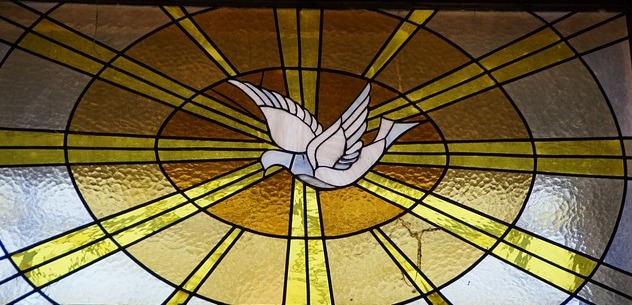Ezra 3:1-13; 1 Cor 16:10-24; Matt. 12:22-32
When I was a child, our Gospel reading (and this whole business of the penalties for “blaspheming against the Holy Spirit”) used to cause me no end of consternation–is there really an unforgivable sin? Is something I could do beyond pardon? Am I doomed for eternity if some day, in a fit of pique, I blurted out, “Go to hell, Holy Spirit?”
The more I tried to talk myself out of worrying about it, the worse it got. What if somehow my words or actions offended the Holy Spirit and I just didn’t know? As you can imagine, this was the kind of passage that was no comfort at all to a child who grew up dealing with unpredictable parental behavior. I was used to things in my young life happening capriciously. Was God no better?
As an adult, after having walked away from religion, I simply consigned the passage to being just another of those passages that made no sense but gave me a reason not to like religion anymore.
Yet–what are we to make of this passage? Well, for starters, context is everything. What we see in the story unfolding around us is that the Pharisees are trying to diss the miracle of Jesus’ healing of a blind and mute man by claiming that the forces of evil are responsible for the healing. What Jesus basically counters in a circular way is by suggesting that if something is good, it is, by definition, of God. In essence, blasphemy of the Holy Spirit is not an act, it’s a condition–the condition of one’s heart being so hardened, one cannot see good within an act of healing. It’s a statement of condition of the hearts of the Pharisees, not a trip wire for us in the 21st century.
In fact, even when we feel fallen away from God, or unsure of God’s presence in our lives, or perhaps even struggling to believe in God, we have an “out”–to simply believe in good for good’s sake. If we can hold on to that, God will catch up to the rest of it with us. God is not a capricious, mercurial parent who sets snares and traps to keep us out of relationship with the divine. The bridge God built through Christ was a bridge of love–because God desires more than anything to be in relationship with us. To believe there’s a God-set trap in that relationship is not only ridiculous, it goes against the promise Jesus made in John 6:40: “This is indeed the will of my Father, that all who see the Son and believe in him may have eternal life; and I will raise them up on the last day.”
This passage serves as a reminder that our tendency is to think of God through the lenses crafted in our humanity or in our family. If we are used to experiencing erratic and capricious behavior, we are prone to think of God in the same terms. If we have chronically been on the wrong end of judgment, we tend to think of God as judgmental. Yet, in short, “the unpardonable sin” is an impossibility if we believe in the power of good, and the power of healing and reconciliation.
When is a time you attributed a judgment or punishment from God, only to discover you were looking at the situation through the lenses of your own experience?
Maria Evans splits her week between being a pathologist and laboratory director in Kirksville, MO, and gratefully serving in the Episcopal Diocese of Missouri as a Priest Associate at Church of the Good Shepherd and Chaplain of the Community of St. Brigid, both in Town and Country, MO.

